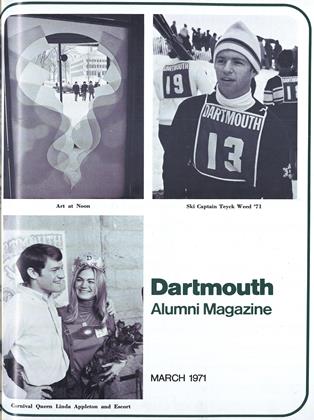He's being called "the director of the year." His second effort in film-making has just won "best picture of the year"" and "best director" awards from the New York Film Critics. The film, "Five Easy Pieces," played at the Nugget a whole week. After over fifteen years in the radio-tv-movie business, Bob Rafelson '54 has been discovered.
The picture which is bringing Rafelson honors is very much his own product. He wrote the original story line besides directing and co-producing. By his own description it is "a purely selfish picture with little action or plot." The hero is a psychological nomad who returns home to try to make peace with his dying father. In the manner of the new Hollywood, the film was made in seven weeks and cost only about $BOO,OOO. The cast and crew came mainly from Rafelson's friends and associ- ates who were all given a piece of the picture.
Bob is bewildered by the total accep- tance of "Five Easy Pieces" after the total rejection accorded his first movie, "Head," a far-out musical fantasy which is now becoming a cult movie. Its stars were the Monkees, a prefabricated rock/singing group Bob and his partner, Bert Schneider, had put together for a television series. The series began as a joke. They auditioned 437 rock musicians, picked out four, built them up as rock stars, sold the idea to Screen Gems and RCA Victor, and ended up selling the group, along with Monkees toys and balloons, to the public. The Monkees series marked a turn in Rafelson's career and the beginning of his association with Schneider, executive producer of "Five Easy Pieces" and actor-author Jack Nicholson, its star.
Bob was born in New York City in 1933, the son of Sydney Rafelson, a hat manufacturer. He attended the Horace Mann School in New York City and Trinity-Pawling School before entering Dartmouth in 1950. At Dartmouth he coedited The Quarterly (but claims never to have had anything published), was chairman of the Philosophy Club, made Green Key, and in his senior year, won the Eleanor Frost Play Competition. After graduation the Army claimed him and sent him to Tokyo to work with the Far East Radio Network. His wife Toby, a Bennington College graduate, married him during that tour in Japan. They now have two children, Peter, 10, and Julie, 8.
Following his army service, he became Director of Station Promotion for CBS Radio in New York, and soon moved into television, editing and adapting for the Witness series and The Play of the Week, before joining ABC-TV as Manager of Program Development. In 1962 he left the New York television scene for a job as writer-director-producer with Revue Studios in Hollywood. It was a few years later that he met Schneider and they formed Studio's corporate umbrella. The first thing they came up with was the Monkees idea, Raybert Productions, Inc., under Columbia and the rest is movie magazine history.
Bob Rafelson '54
 View Full Issue
View Full Issue
More From This Issue
-
 Feature
FeatureTHE FINANCIAL CRUNCH
March 1971 -
 Feature
FeatureART AT NOON
March 1971 By PETER D. SMITH, -
 Feature
FeatureCONFERENCE CENTER
March 1971 -
 Article
ArticleThe Undergraduate Chair
March 1971 By LAWRENCE G. MANLEY '71 -
 Books
BooksBriefly Noted
March 1971 By JOHN HURD '21 -
 Class Notes
Class Notes1950
March 1971 By JACQUES HARLOW, ERIC T. MILLER
Article
-
 Article
ArticleA REUNION OF "THE DARTMOUTH COMPANY"
June, 1922 -
 Article
Article$26,000 Bequest Added To Scholarship Funds
December 1952 -
 Article
ArticleGive a Rouse
SEPTEMBER | OCTOBER 2014 -
 Article
ArticleSWIMMING
FEBRUARY 1968 By ALBERT C. JONES '66 -
 Article
ArticleHanover Browsing
January 1937 By Herbert F. West '22 -
 Article
Article"The Dartmouth," An Explanation
APRIL 1929 By W. L. Scott, Editor

